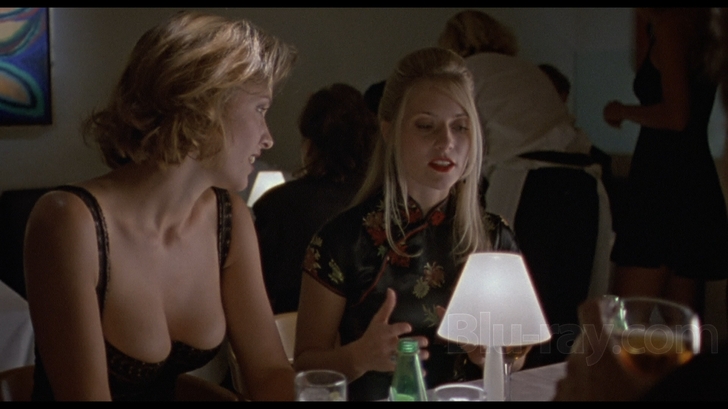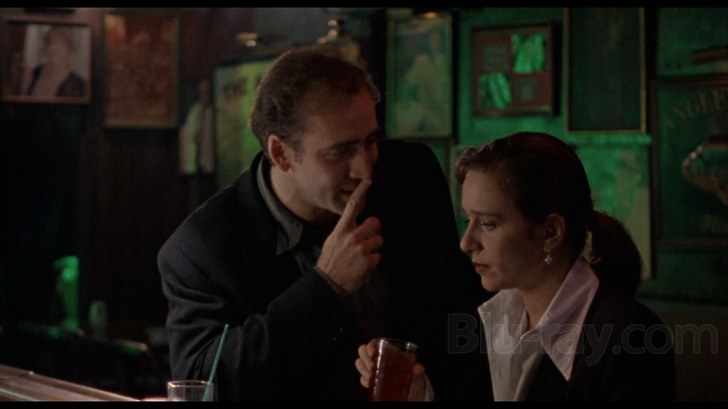Leaving Las Vegas Blu-ray Movie
HomeLeaving Las Vegas Blu-ray Movie 
Metro-Goldwyn-Mayer | 1995 | 111 min | Unrated | Feb 01, 2011
Movie rating
7.7 | / 10 |
Blu-ray rating
| Users | 3.8 | |
| Reviewer | 4.0 | |
| Overall | 3.8 |
Overview
Leaving Las Vegas (1995)
Avowed alcoholic Ben drank away his family, friends and, finally, his job. With deliberate resolve, he burns the remnants of his life and heads for Las Vegas to end it all in one final binge. On the Strip, Ben picks up a street-smart hooker named Sera in what might have been another excess in his self-destructive jag. Instead, their chance meeting becomes a respite on the road to oblivion as something connects between these two disenfranchised souls.
Starring: Nicolas Cage, Elisabeth Shue, Julian Sands, Richard Lewis, Valeria GolinoDirector: Mike Figgis
| Melodrama | Uncertain |
| Drama | Uncertain |
| Romance | Uncertain |
Specifications
Video
Video codec: MPEG-4 AVC
Video resolution: 1080p
Aspect ratio: 1.85:1
Original aspect ratio: 1.85:1
Audio
English: DTS-HD Master Audio 5.1 (48kHz, 24-bit)
French: Dolby Digital 2.0
Spanish: Dolby Digital 2.0
Subtitles
English SDH, French, Spanish
Discs
50GB Blu-ray Disc
Single disc (1 BD)
Playback
Region free
Review
Rating summary
| Movie | 4.0 | |
| Video | 3.5 | |
| Audio | 4.0 | |
| Extras | 0.5 | |
| Overall | 4.0 |
Leaving Las Vegas Blu-ray Movie Review
The Odd Couple.
Reviewed by Jeffrey Kauffman March 10, 2011Hollywood has long had a love affair with substance abuse, and that’s just from the residents themselves. (Rim shot please). Seriously, film has explored various addictions from surprisingly early, and several classics from Hollywood’s Golden Era skirted around the edges (and sometimes much more than that) of alcoholism, notably the original 1937 A Star is Born and Billy Wilder’s uncharacteristically sober (sorry, couldn’t resist) The Lost Weekend, which earned Ray Milland a Best Actor Academy Award. Addictions of various kinds continued to populate mainstream films over the next several decades, including such well regarded films as Otto Preminger’s The Man With the Golden Arm to Blake Edwards’ The Days of Wine and Roses. Depictions of drug use became almost commonplace in film by the late 1960’s and beyond, and that particular addictive behavior seemed to become the favorite of a new generation of screenwriters and directors. And so Mike Figgis’ 1995 drama Leaving Las Vegas almost seemed like a throwback to filmic days of yore with its gritty and unsettling portrayal of a dissolute alcoholic screenwriter named Ben Sanderson (Nicolas Cage in his Academy Award winning performance) who reaches out for a strange sort of romantic détente with a Vegas prostitute named Sera (Elisabeth Shue). Leaving Las Vegas turns out to really be less about Cage’s addiction, as harrowing as it is, than about the patently strange rapprochement these two wounded souls find over the course of a short time in Sin City.

Very little in Mike Figgis’ filmography would have pointed to him making the sort of quasi-Art House fare that Leaving Las Vegas is at its very core. Figgis had helmed several relatively big budget mysteries and noirish thrillers, but really nothing in his oeuvre before Leaving Las Vegas hinted at the emotional depths he was capable of bringing to the screen. Though Figgis is a Londoner, he may have fallen prey to that old Hollywood bugaboo of being fascinated with itself, for part and parcel of Leaving Las Vegas’ subtext is the fact that Ben is a once successful (or at least seemingly once successful) Hollywood insider who has let substance abuse destroy his promise. Sound familiar?
Leaving Las Vegas is done in an intentionally lo-fi manner which allows the emphasis to be put squarely on the performances and, by way of those, the characters. In fact there’s little if any plot to this film; Ben gets fired from his job in Los Angeles and goes to Las Vegas to drink himself to death, where he meets and falls in love with Shue, who is under the thumb of a brutish Latvian pimp named Yuri (Julian Sands). Ben and Sera perhaps recognize a mutual desire for escape and form a tenuous friendship which rather quickly blossoms into something more than that. But what exactly? Is this a traditional, if dour, romance? Hardly. These are two deeply scarred individuals who insist the other can’t make even a passing criticism, let alone request any major (or even minor) behavioral changes. So obviously marriage is out of the question.
When the film was released it caused something of a minor revelatory stir among critics and audiences. Though few probably even paid attention to Figgis’ lack of depth in prior outings which might have paved the way for a film this achingly desperate, what really threw filmgoers for a loop was the mastery of Cage and Shue in two roles that take over the top film character clichés and remake them into something sad, vulnerable and heartbreaking. Ben and Sera are a curiously doomed couple, but in some ways this is really Sera’s story more than Ben’s, as odd as that may seem. Ben’s conclusion is already largely foregone, but what about Sera? What does she see in Ben and why does she become, in his words, his “angel”? That is the question that haunts the inner essence of Leaving Las Vegas and gives it its true emotional impact. It also leads to one of the few false moves of the screenplay, late in the film, when Sera does something uncharacteristic (especially for a character who has already been shown to be completely self aware and highly intelligent), putting her in harm’s way and sending the film reeling into a thankfully brief sidebar of melodrama. This unfortunate tangent is even more inexplicable (and perhaps even inexcusable) because Sera is shown throughout Leaving Las Vegas taking part in that other favorite of Hollywood types, namely psychoanalysis, in a series of interstitials where she confesses her inmost secrets to an unseen unanalyst. This is not your everyday commonplace hooker, to say the least.
This is not an easy film to sit through and some of its elements may strike some more jaded viewers as unnecessarily overdramatic to the point of self parody. But there’s an honesty at the core of Cage’s tortured performance and Shue’s amazingly well done turn that gives the film an energy beyond the sometimes trite formulas it can’t quite avoid utilizing. Especially moving in this regard is the final scene, an understated denouement that may not exactly rise to the level of Charles Foster Kane’s “Rosebud” in terms of filmic enigmas, but which opens a soul searching door of such profundity that it invites the viewer to question the very nature of Ben’s existence and what he’s done with his life. Is this a basically good man who has thrown it all away due to an inconquerable disease? Or is he really just kind of a wastrel, a lout who allows Sera to provide a tenuous connection to humanity and real emotion? It’s a question which isn’t easy to answer, and it means this Las Vegas may not leave your memory for quite some time to come.
Leaving Las Vegas Blu-ray Movie, Video Quality 

Leaving Las Vegas was shot on a figurative dime in 16mm, so don't expect bristling high definition content on this AVC encoded disc which offers a 1080p transfer in 1.85:1. This is an overtly grainy, soft looking film that only manages to muster anything approaching a standard looking Blu image in some of the brightly lit scenes (notably the horrifying sequences at the bank where Ben can't sign a check—and look for Carey Lowell's cameo in that segment). The bulk of this film is dingy, drab and dark, as befits the inner lives of its troubled characters, and as such the image is frequently murky and not very well defined. Colors, while not especially robust, are decently saturated, though black levels and contrast are often problematic. All of this can be traced squarely to the source elements and to Figgis' lo-fi choices in how to film Leaving Las Vegas. There is also some minor, though noticeable, print damage on this release which may bother the more persnickety videophiles.
Leaving Las Vegas Blu-ray Movie, Audio Quality 

While Leaving Las Vegas is granted a decent lossless DTS-HD Master Audio 5.1 mix on this release, as with the image, don't expect aural fireworks. The surrounds are utilized almost exclusively for the jazz tinged underscore, which features some great crooning by Sting, Don Henley and others. There is sporadic usage of rear channels in a couple of scenes, notably an early scene in a crowded restaurant where Ben is trying to scrounge up some money for drinks. But the bulk of this film is up close and personal, frequently involving only Ben and Sera, so there simply isn't a ton of opportunity to present knock your socks off immersion. Dialogue is very well reproduced here, and there's also excellent balance between dialogue and the underscore. Some of Figgis' cues (yes, he wrote the music, too) feature a screechy sounding sax which can sound just a tad overbright at times, but otherwise this is a solid, if not very showy, DTS track that provides excellent fidelity.
Leaving Las Vegas Blu-ray Movie, Special Features and Extras 

Unfortunately, only the Trailer is included on this budget priced disc.
Leaving Las Vegas Blu-ray Movie, Overall Score and Recommendation 

Anchored by two amazing performances by Cage and Shue, Leaving Las Vegas is a sort of quasi-Art House film which is unabashedly dour, depressing and dark. Less about the addictive qualities of alcohol than about two tragically wounded souls trying to find solace in each other's arms, the film may not be easy to watch, but it's unforgettable. Recommended.
Similar titles
Similar titles you might also like

Waterloo Bridge
Warner Archive Collection
1940

Memoirs of a Geisha
2005

The Great Gatsby
2013

The Best of Everything
Limited Edition to 3000
1959

Les Misérables 4K
2012

Written on the Wind
1956

Magnolia
1999

Sling Blade
1996

Stella Dallas
1937

Valley of the Dolls
1967

Europe '51
Europa '51 / The Greatest Love / English and Italian Versions
1952

The Help
2011

Seven Pounds
2008

Boys Don't Cry
1999

Margaret
Theatrical and Extended Cut on DVD
2011

Closer
2004

Under Capricorn
1949

The Happy Ending
1969

No Down Payment
Limited Edition to 3000
1957

The Cider House Rules
1999

